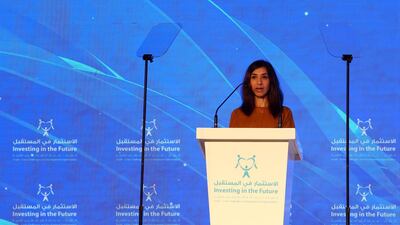Nadia Murad on Wednesday used a Sharjah conference to call on the international community to seek justice for minorities, in her first major public appearance since winning the Nobel Peace Prize.
The human rights activist, who was awarded the prize this month for her work against wartime sexual violence, spoke at the Investing in the Future Conference.
“A few weeks ago I was chosen as a laureate for the Nobel Peace Prize,” said Ms Murad, a Yazidi. “This comes with responsibility – the responsibility to face challenges and the responsibility to speak up against genocide.
“I have the responsibility to translate peace and stability on the ground for future generations.”
The first Iraqi to receive the peace prize, she talked about her struggles at the hands of ISIS after they captured her and other Yazidi women.
“On August 3, 2014, the world endured another genocide,” Ms Murad said. “In the early morning hours, Daesh attacked my village and many other villages to begin a campaign of ethnic cleansing.
“Thousands of innocent people were murdered and thousands of women and children were held captive. They endured unspeakable acts of violence. We lost an infinite number of people. They are still held captive. More than 3,000 women and children remain in captivity.”
Ms Murad set up Nadia’s Initiative, which lobbies for women and minorities in crisis.
“I did not choose this life,” she said. “It was imposed on me because of what we have undergone as a minority. Many minorities have had a history of persecution. Women, in particular, have suffered greatly as they have been the continuous victims of sexual violence.
“We are still undergoing that in captivity. The international community must take serious steps to support minorities.”
She said although Yazidis were freed from ISIS a year ago, the international community had not supported them to return to their homeland. By far the most still live in Iraqi camps.
“Nadia’s Initiative is working to get the needed support for the Yazidi homeland,” Ms Murad said. “The situation is dire. Yazidi homes and villages were reduced to rubble.
______________
Read more:
Honour Nobel Prize winners by stamping out sexual violence
Denis Mukwege and Nadia Murad win Nobel Peace Prize 2018
______________
“We can choose to protect minorities and ensure extinction is not an outcome for any people or culture.”
Ms Murad was born into a family of farmers in the village of Kojo in Sinjar, but her life changed when ISIS captured areas across northern Iraq.
She was only 19 when she was taken alongside thousands of other Yazidis. While women were enslaved, the men were executed, including six of Ms Murad’s brothers.
She was held in Mosul for a year, where her captors subjected her to beatings and rape. She escaped in 2015 with the help of neighbours.
“I survived to be the voice of an infinite number of people who have fallen victim to ethnic cleansing and sexual violence,” Ms Murad said. “I represent young women who do not yet have access to such a platform to say what needs to be said.
“We have to work together to make sure genocidal campaigns not only fail, but lead to accountability for the perpetrators and justice for the survivors who deserve a safe pathway home.
“The international community failed to protect minorities from Daesh.
“But it should not fail also in the reconstruction process and hold accountable all those who are implicated in crimes.”


